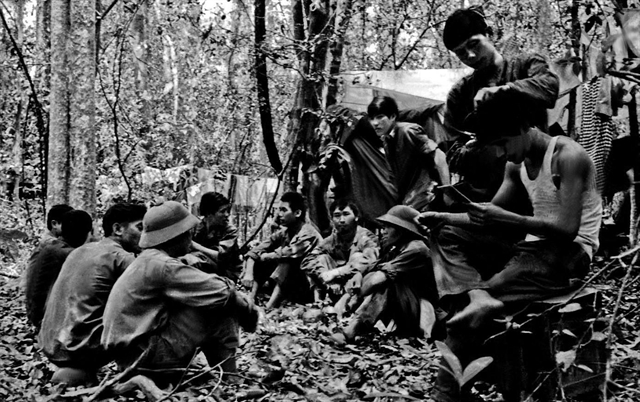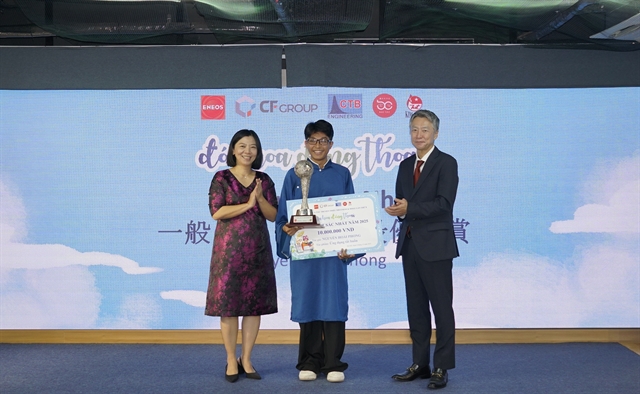

News reporters played an important role in the American War. They informed people what was happening at the front.

|
| IN IT TOGETHER: A group of reporters from Ha Noi-based Vietnam News Agency joining the Hồ Chí Minh Campaign to support the Liberation News Agency in the south. VNA/VNS File Photo |
by Lê Hương
The first piece of news by Thông Tấn Xã Giải Phóng (Liberation News Agency) – the southern counterpart of Vietnam News Agency during war time – was sent to Hà Nội at 7pm, October 12, 1960 from Chàng Riệc Forest, Tây Ninh military base of The National Front for the Liberation of South Việt Nam.
The day marked the start of the agency’s historic mission to report on the fight against the Americans by southern people to domestic and international audiences.
Since then, the reports sent to Hà Nôi every day at 6pm became crucial sources for news offices in Việt Nam and overseas through transmission by the Vietnam News Agency.
During its 15 years of operation between 1960 and 1975, the Liberation News Agency moved its temporary office dozens of times to ensure the safety of the staff.
News and photos by the agency’s reporters covered the most up-to-date events from Cà Mau to Quảng Trị, from rural areas of U Minh Thượng to Sài Gòn City, which provided information not only for people in the country on the war in the south but also military officers to analyse the situation and make strategic decisions.
The Liberation News Agency helped turn public opinion and garner international support for the Vietnamese people in military and diplomatic battles, helping to bring about victory for the Vietnamese people in the war against America in April 1975.
According to journalist Thanh Bền, who used to work at the Liberation News Agency, all staff at the agency including reporters, technicians and leaders had to help dig shelters, trenches and wells, as well as set up tents; fetch sacks of rice; carry papers after printing; and plant vegetables.
“We supplied almost everything ourselves and shared the hardship,” he wrote in one article in Tin Tức (News) newspaper.
The agency even raised pigs and chickens, but not roosters for fear that the crowing would alert enemies.
“We even caught fish and trapped wild animals to increase our supplies of food,” he wrote. “Another important thing was maintaining a self-defence armed force to be ready to fight attackers.”
Bền recalled long sieges by the American troops, when they did not have food. The cook suggested picking bứa – a kind of wild mangosteen – to divide among the staff.
She cooked vegetables, salted the bứa to use as pickled vegetables and made the core of the fruit into soup.
“If we had salted peanuts, we could survive for weeks in the middle of the siege,” he added.
Bền said moving the office was the most disturbing time, as all the daily routines were affected except sending news to Hà Nội non-stop.
He remembered he experienced eight moves from Dương Minh Châu military base (Tây Ninh) to Mã Đà (Biên Hòa), then returned to Dương Minh Châu again; to Cây Dầu, Sáu Cầu to Kampong Cham in Cambodia then returned to Tây Ninh again
“The technicians who had to carry generators and other machines on their shoulders suffered the most during the moves, especially at night and in stormy weather,” he said.
The Liberation News Agency lost 240 reporters, editors and technicians during their missions, which is almost 50 per cent of the agency’s staff at the end of 1974.
The Việt Nam Journalists’ Association recognised the Liberation News Agency as losing the most journalists in the history of the Vietnamese revolutionary press.
On May 12, 1976, the Vietnam News Agency and the Liberation News Agency merged under the common name Vietnam News Agency. VNS
GLOSSARY
The first piece of news by Thông Tấn Xã Giải Phóng (Liberation News Agency) – the southern counterpart of Vietnam News Agency during war time – was sent to Hà Nội at 7pm, October 12, 1960 from Chàng Riệc Forest, Tây Ninh military base of The National Front for the Liberation of South Việt Nam.
The Thông Tấn Xã Giải Phóng (Liberation News Agency) was the southern counterpart of the Vietnam News Agency because it did the same job as the Vietnam News Agency in the south of the country.
The day marked the start of the agency’s historic mission to report on the fight against the Americans by southern people to domestic and international audiences.
An audience is a group of people who listen to something, or in this case, read the news.
A domestic audience, in this case, is the people who read the news inside the country.
Since then, the reports sent to Hà Nôi every day at 6pm became crucial sources for news offices in Việt Nam and overseas through transmission by the Vietnam News Agency.
Sources are people who tell reporters what is going on. Crucial sources are very important sources.
Transmission is the sending out of information.
During its 15 years of operation between 1960 and 1975, the Liberation News Agency moved its temporary office dozens of times to ensure the safety of the staff.
A temporary office is one that is not in a place for a long time and will move on to another place.
Dozens means many, although technically it means multiples of twelve.
News and photos by the agency’s reporters covered the most up-to-date events from Cà Mau to Quảng Trị, from rural areas of U Minh Thượng to Sài Gòn City, which provided information not only for people in the country on the war in the south but also military officers to analyse the situation and make strategic decisions.
Rural areas are country areas.
To analyse means to look at information and see if you work out any meaning in it, in terms of what causes things to happen and what could happen next.
Strategic decisions are decisions that matter a lot when it comes to achieving things in the future.
The Liberation News Agency helped turn public opinion and garner international support for the Vietnamese people in military and diplomatic battles, helping to bring about victory for the Vietnamese people in the war against America in April 1975.
Public opinion is what most people think about something.
Garner means collect.
Diplomatic battles are battles between government officials from different countries that take place through discussions, debates and commentaries.
According to journalist Thanh Bền, who used to work at the Liberation News Agency, all staff at the agency including reporters, technicians and leaders had to help dig shelters, trenches and wells, as well as set up tents; fetch sacks of rice; carry papers after printing; and plant vegetables.
Shelters are places where people seek protection. It may be from rain, bullets or any other threat.
Trenches are holes dug in the ground where people can find protection, especially from gunfire.
Wells are holes from which people can draw water.
The agency even raised pigs and chickens, but not roosters for fear that the crowing would alert enemies.
Roosters are adult, male chickens.
Crowing is the noise that roosters make.
To alert enemies means to attract their attention.
“We even caught fish and trapped wild animals to increase our supplies of food,” he wrote.
When wild animals are trapped they are captured in a device that catches them and stops them from being able to move away.
“Another important thing was maintaining a self-defence armed force to be ready to fight attackers.”
Maintaining means “keeping going”.
Bền recalled long sieges by the American troops, when they did not have food.
Sieges are attacks on people who are stuck in a place.
She cooked vegetables, salted the bứa to use as pickled vegetables and made the core of the fruit into soup.
Pickled vegetables are vegetables that have been kept in vinegar or another acidy liquid to keep edible.
The core of a fruit is the central part.
Bền said moving the office was the most disturbing time, as all the daily routines were affected except sending news to Hà Nội non-stop.
Disturbing means “worrying”.
Your routines are the things you do at the same time, day after day.
“The technicians who had to carry generators and other machines on their shoulders suffered the most during the moves, especially at night and in stormy weather,” he said.
Generators are devices that make electricity.
The Việt Nam Journalists’ Association recognised the Liberation News Agency as losing the most journalists in the history of the Vietnamese revolutionary press.
Recognised the Liberation News Agency as losing the most journalists in the history of the Vietnamese revolutionary press means believing this to be true.
On May 12, 1976, the Vietnam News Agency and the Liberation News Agency merged under the common name Vietnam News Agency.
Merged means “joined together”.
When two organisation merge under a common name, they take on the same name.
WORKSHEET
Find words that mean the following in the Word Search:
f | s | t | u | d | i | o | s | e | p |
k | s | t | o | r | m | r | y | h | e |
i | n | o | a | r | e | i | e | w | a |
h | m | a | u | t | l | e | o | y | n |
s | r | a | s | t | t | r | a | y | u |
d | r | o | y | m | h | s | n | c | t |
c | o | i | l | d | h | o | o | d | m |
r | l | c | p | m | t | a | l | e | s |
ANSWERS: 1. Rooster; 2. Peanut; 3. South; 4. Stormy; 5. May.




